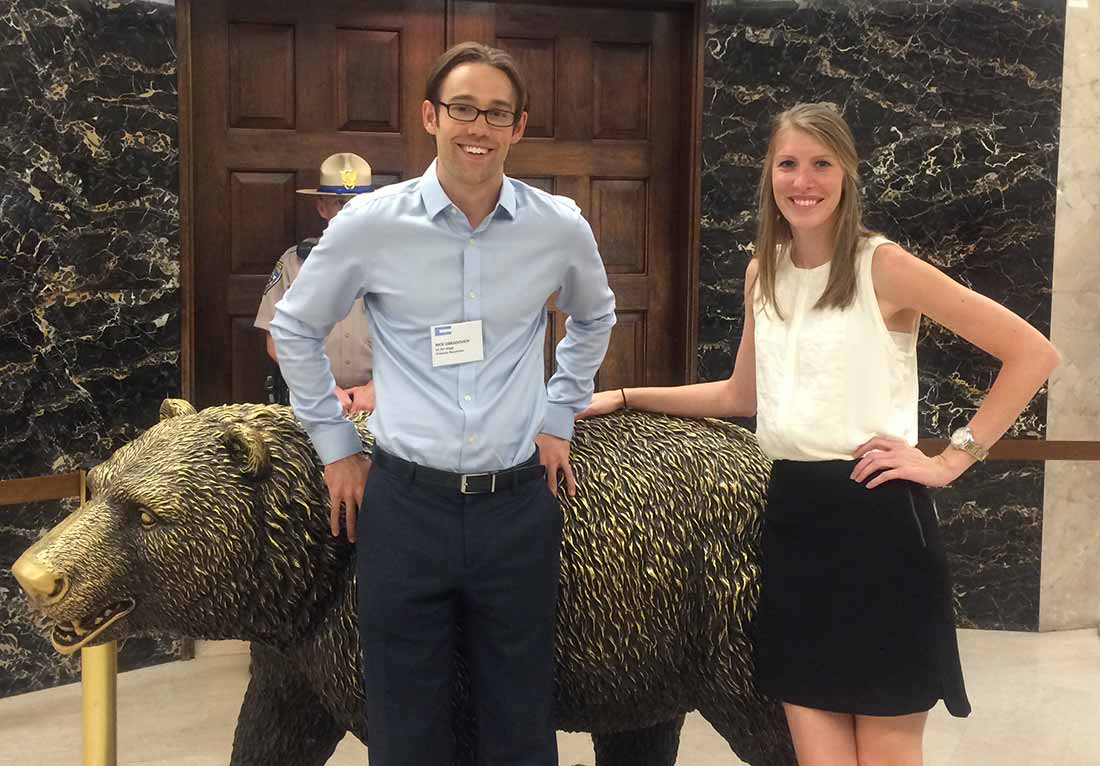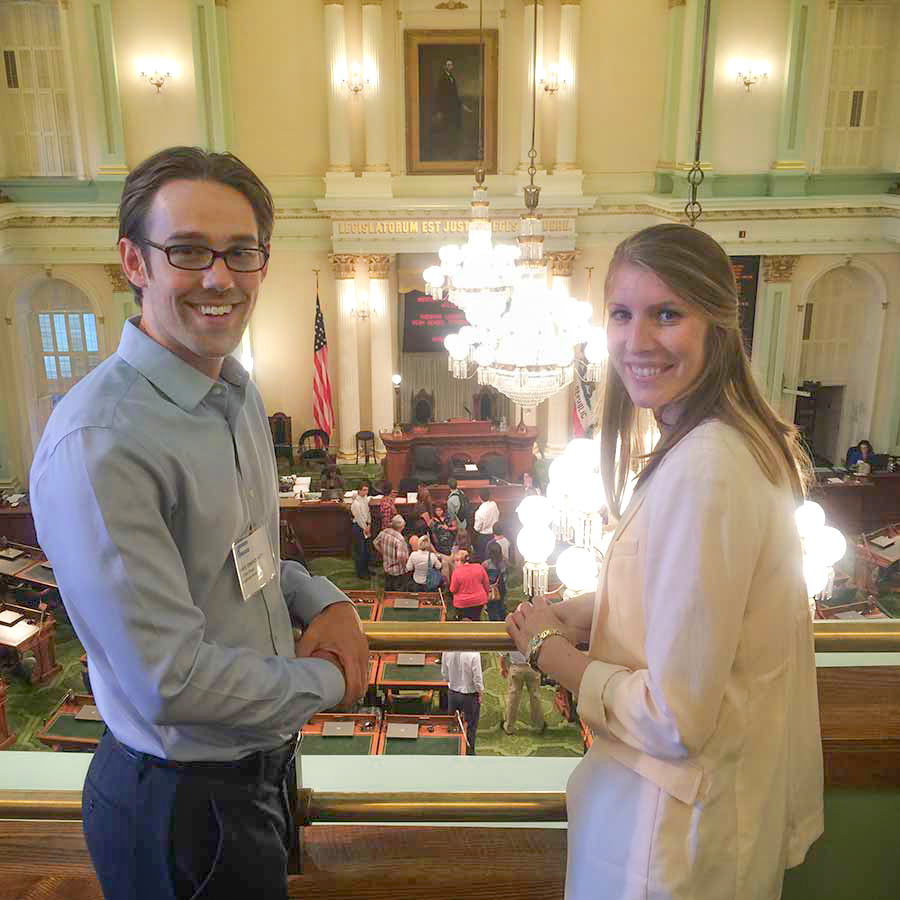
By:
- Christine Clark
Published Date
By:
- Christine Clark
Share This:
Graduate Students Show State Legislators Importance of Supporting Next Generation of Big Ideas
A delegation of University of California graduate students and deans traveled to Sacramento April 28 to deliver the message to lawmakers that graduate student research is central not only to the future of UC, but to that of the state and the nation as well.
Representing UC San Diego at the sixth annual Grad Research Day was Kara Finzel, a Ph.D. candidate in the department of chemistry and biochemistry; and Nick Obradovich, a Ph.D. candidate in the department of political science; as well as Kim Barrett, dean of UC San Diego’s Graduate Division.

Nick Obradovich and Kara Finzel represented UC San Diego at the sixth annual Grad Research Day.
In a series of face-to-face meetings, graduate students from each UC campus sat down with lawmakers and their staff to give them a better sense of the work they do and why their work is vital to California and its residents.
“It's critical that state legislators understand the role graduate students play in research and education at UC,” Barrett said in a welcome address to graduate students and deans from all ten campuses prior to the legislative meetings. “UC is unique among the other public higher education segments because we produce 70 percent of Ph.D.s in California. And our graduate students are generating new knowledge that will benefit humanity, creating new companies and jobs, and helping to solve the most pressing problems facing our state, nation and the world.”
Following the welcome reception, UC San Diego’s graduate students and dean, as well as UC San Diego government relations staff met, with local legislators and their staff, which included Sen. Joel Anderson,( R-38), Assembly Speaker Toni Atkins (D-78), Sen. Pat Bates (R-36) Assemblymember Rocky Chavez (R-76), Assemblymember Lorena Gonzalez (D-80), Sen. Ben Hueso (D-40), Assemblymember Brian Maienschein (R-77), Assemblymember Marie Waldron (R-75), and Assemblymember Shirley Weber (D-79).
In legislative meetings, Obradovich explained his research on the politics and political effects of climate change. “I’m particularly interested in the ways that political opinions and attitudes shape climate change debates and related policy outcomes.”
In the United States, Obradovich is surveying social media sites such as Twitter to gauge how weird weather affects discussion of climate change and climate-related legislation.
“When people experience unusual weather events, does it increase the rates at which they talk about climate change? For example, if it’s unusually warm, or if people are dealing with consequences of California’s drought, will they express greater concern about climate change? On the other hand, if it is unusually cold, does this weather spur Twitter posts denying climate change or global warming?”
In addition, Obradovich and his co-authors are employing massive tweet datasets to aid response in the face of natural disasters such as Hurricane Sandy.
“Part of the problem with Hurricane Sandy was a lack of information about the worst hit areas. A lot of people in need did not get help in time,” he said. “So, we gathered millions of tweets surrounding the hurricane and are investigating the relationship between Twitter activity about the storm and the actual damages that people faced from the disaster. We hope results from this investigation can be further developed to aid first-responders in future disaster scenarios.”

Finzel is Ph.D. candidate in the department of chemistry and biochemistry and Obradovich is a Ph.D. candidate in the department of political science.
Finzel spoke about how she is trying to unlock a basic mystery: how bacteria and other organisms produce important pharmaceuticals and how they produce fatty acids, an essential component in biofuels production. Understanding the biological mechanisms at work could pave the way for major advances in alternative fuels and drug development.
As she described it to legislators and their staff, “About 20 years ago, people in my field discovered the pathways in bacteria and algae that are the equivalent of the assembly line. Scientists thought ‘what if we took the best parts of each assembly line and combined them to make more efficient bio fuels and more effective drugs,’ but that theory didn’t work. So, my job is studying the assembly line so that we can make those advances in the near future.”
Finzel said she found lawmakers and staffers from both sides of the aisle to be receptive and engaged with the information she presented during her meetings with them.
Assemblymember Weber said, “We really appreciate you coming here to show us all the great work you are doing,” in her meeting with Finzel, Obradovich and Barrett.
Part of the goal of the day in Sacramento is to show legislators the direct economic benefit of graduate student research, which has resulted in new technologies, new industries and an expanded workforce that directly benefits California’s economy. These students tackle issues critical to our society—from sustainability to public health and technology advancement––all of which solve key problems in California and beyond.
“It’s critical for our representatives to hear directly from you on what is happening with graduate student research,” University of California President Janet Napolitano said at a luncheon address to the students participating in grad research day. “You demonstrate the depth of the different kinds of research conducted across the UC system and how our students are world-class.”
In a meeting with Laurel Brodzinsky, a representative from Assemblymember Gonzalez’s office who is a UC San Diego alumna, Finzel, Obradovich and Brodzinsky all spoke about the benefits of attending UC San Diego.
“I liked my undergraduate experience at UC San Diego a lot,” Brodzinsky said. “I loved my TAs, they were so excited about their research and the depth of their work was very impressive.”
Throughout the day, Barrett spoke of the importance of investing in graduate education.
“It’s a priority at UC San Diego to invest in graduate education, as it pays off,” said Barret. “We’re very appreciative of the state’s support because we have to compete with top universities in order to get the best students in the word, students like Nick and Kara.”
According to Barrett, reduced state funding greatly threatens the health of graduate programs. However, state investment in graduate education is not a matter of dollars alone. It also involves a continued commitment to supporting the resources that enable these students to flourish, such as the faculty time required to mentor and train graduate students.
Through its graduate programs, the University of California trains and supports more than 26,000 Ph.D. students and almost 6,000 postdoctoral fellows who are engaged in original research.
At UC San Diego, there are approximately 3,000 Ph.D. students in a wide range of disciplines.
“Graduate students’ charge is to find questions worth answering,” Barrett said. “And they are often questions directly relevant to real-world problems—problems like earthquakes, energy and addressing the cultural and social issues of the state.”
Share This:
You May Also Like
Stay in the Know
Keep up with all the latest from UC San Diego. Subscribe to the newsletter today.


